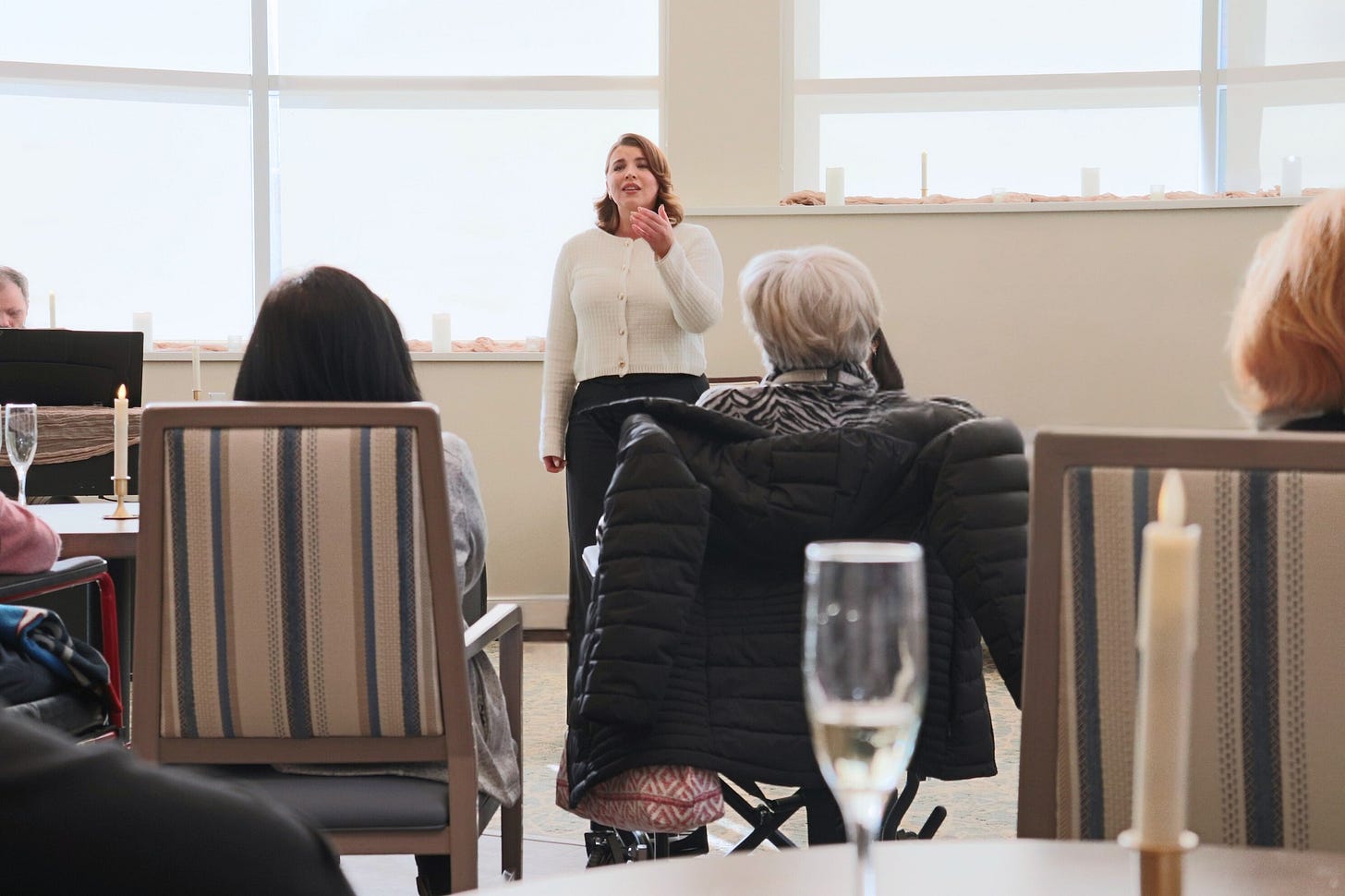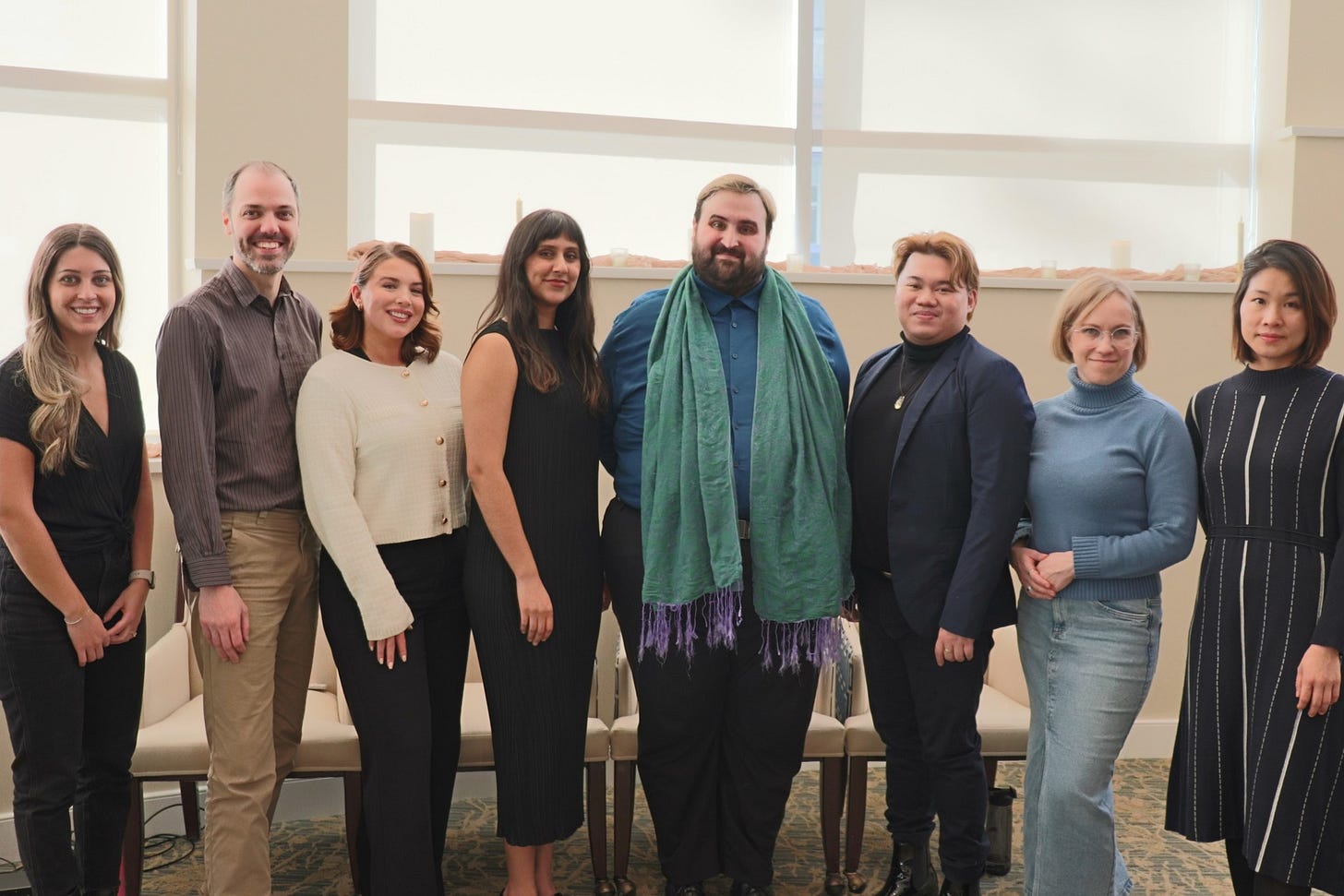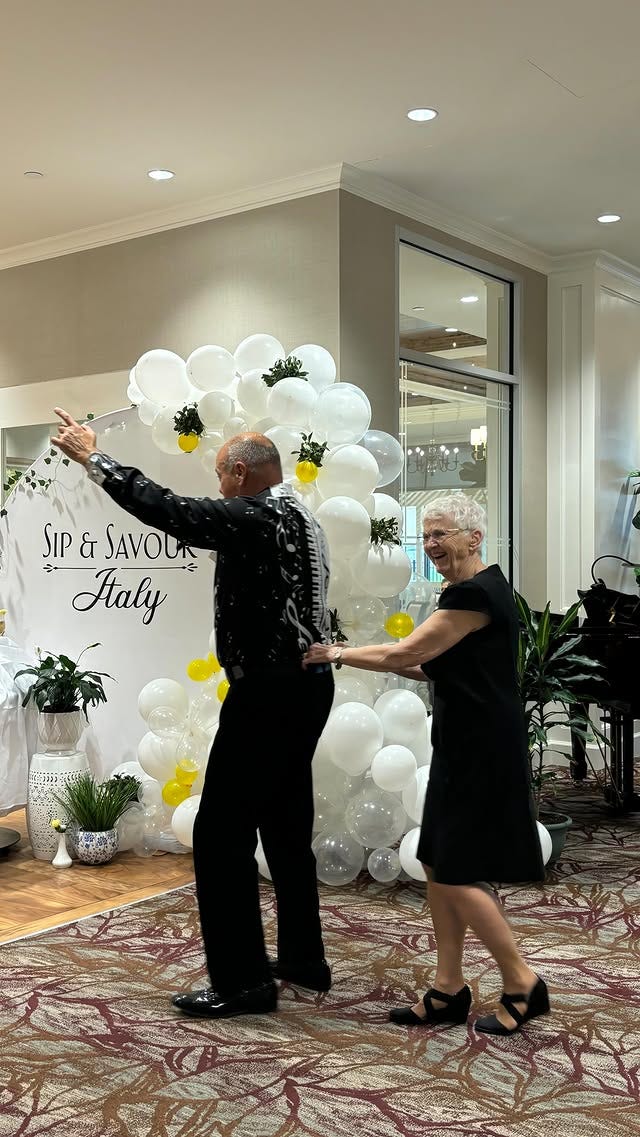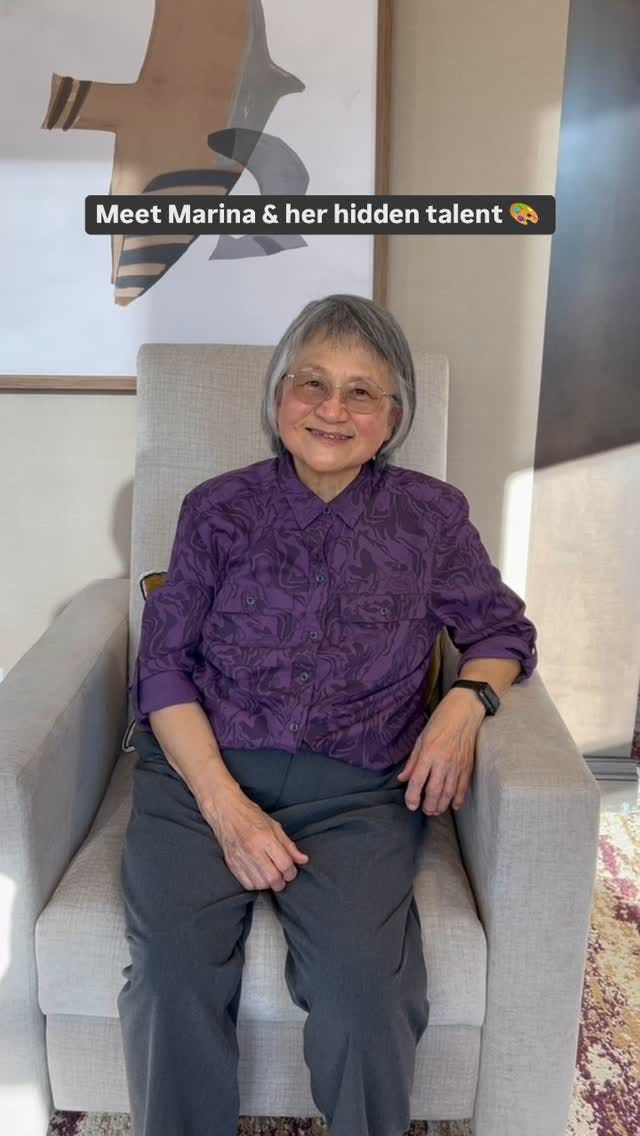Music That Remembers Us
Amica Senior Lifestyles and Vancouver Opera share the power of live music to inspire connection, joy, and reflection in senior living.

Tabitha Brasso-Ernst:
We are Inside Vancouver Opera, and I am Tabitha Brasso-Ernst, Engagement Strategist with Vancouver Opera. Today I have the honour of chatting with the Director of Quality of Life at Amica Senior Lifestyles, Ashley Sumler.
Amica is one of Vancouver Opera's wonderful sponsors, and we are so grateful for all of their support. Arts and culture is a key component to the success of Amica's initiatives for senior care. Through their collaboration with Vancouver Opera, we are proud to connect with Amica's mission, bringing the transformative power of opera and classical music to seniors in meaningful and accessible ways, and to keep the arts alive moving forward.
Tell me a little bit about yourself and your position at Amica.
Ashley Sumler:
I'm the Director of Quality of Life at Amica Senior Lifestyles, which means I'm responsible for supporting our teams to deliver really exceptional premium experiences for our residents. All of that to say, we want to inspire them to live their best life and look forward to the new possibilities that come with living at Amica. I've been with Amica almost 15 years in various roles, but always centred around the resident experience.
Tabitha Brasso-Ernst:
I'm just wondering what inspired Amica to focus on cultural enrichment as a cornerstone of its senior living approach?
Ashley Sumler:
Really, it's our residents. We're really blessed to be able to serve a group of residents who have just such amazing life experiences. So many of our residents have been members at the opera, or have enjoyed going to different art galleries and museums, and having the opportunity to have travelled in their lives. And so they really inspire us to say, how do we help them continue to enjoy those experiences even after they've moved in with us. And how do we then personalize, by each location, what we offer to meet the needs of the people who live there.
Really, creating opportunities to either get out into the community to do things like attending Vancouver Opera and be able to get out into those cultural experiences. But in some cases, that also means we bring the cultural experiences into our residences so that we can create connection and sort of shared experiences that allow our residents to connect together with each other, but also with our team.
At the end of the day, growing old is a human experience and it doesn't mean that you live less. And we just want to showcase all the amazing opportunities that come with getting older and being able to enjoy your life even as your care needs change. And so that's one of our focuses is really providing great experiences, but also being able to support care needs as they evolve as a person ages as well.
Tabitha Brasso-Ernst:
Would you be able to elaborate a little bit more on the various cultural programs or activities that Amica offers?
Ashley Sumler:
In our enrichment programming, we're really focused on supporting all aspects of a person. Really meaningful, purposeful activities, not just fun for fun's sake all the time, but really promoting belonging and encouraging connection. And that's where the arts and cultural programming can really help us. There's such value in using things like music and art as a way to help connect people together. And it allows people of all abilities to engage in a meaningful way.
Tabitha Brasso-Ernst:
It’s so great that you mention music because this is kind of a personal thing for me. I used to actually be a caregiver many years ago. When I used to work with patients that had dementia, it was often music that would spark their memory. And so they wouldn't be able to remember most things in their lives, but they would be able to recite back lyrics and melodies that they remembered as children. And so that was always really heartwarming to witness. And it's just the power of music, right?
Ashley Sumler:
Absolutely, I have one resident I'm immediately thinking of and exactly to your point, while her language and her comprehension was changing as she was aging, she could sing every word to Amazing Grace. She was harmonizing. She knew four or five verses more than anyone else at that particular residence. I just remember getting to connect with her through that experience and the joy that it brought her, but also that it brought us to see that she could still tap into that part of herself, and the part of music that brought her such joy. It's really special when you see a person connect with a piece of music that's resonated with them or again, brings back great memories.
Tabitha Brasso-Ernst:
Are there any other programs or events that Amica offers that you find the community picks up on?
Ashley Sumler:
Absolutely, music is always a hit. Right from the young performers from the opera getting to come and perform at a few of our residences certainly was a unique experience for them. But things like art therapy and music therapy also come into play.

The other piece around the cultural engagement that's really popular is these different cultural immersive experiences that we offer through our quarterly Sip & Savour events. And so these are events we run every quarter across the whole company. We pick a travel destination and then really lean into the sites, the sounds, the food, the music, the culture of those locations and put on a really magical event. That allows people to sort of travel to those places even though they may not be physically able to go there again. And we incorporate also things like virtual reality into those types of events.
We had a Sip & Savour Italy about six months ago and there was a resident who hadn't had the opportunity to get back to Italy. Through the sights, sound, the gelato cart, and all of these things that the team was offering, she was just so delighted. When we had her experience the virtual reality and she got to go back to places she had been as a younger person. She just thanked us so much about getting the opportunity knowing she would never physically be able to travel there again.
Tabitha Brasso-Ernst:
How does Amica ensure that these activities are inclusive for residents with various needs or abilities?
Ashley Sumler:
At the end of the day, we really seek to know our residents incredibly well. We want to know what their life was and who they are as people before they even come to us. And that allows us to both tailor, not only the content and the type of programs that we offer, so that it meets the expectations they have of experiences they've had previously, but also understanding their ability level and what would be meaningful for them.
We have some residents who want to passively participate. They're not joiners, they're not into sort of more group programming, but them tapping their toes sort of on the outside listening in, is really important and a way for them to participate. In other cases, we hand out percussion instruments or scarves so they can participate in movement related to the music. Sometimes people are singing along. Really it's about us creating an environment where they're set up for success. Whether that's through having the right team members there to support, whether that's having the right tools there to support. Really knowing our residents well and what they're looking for in their lives helps us create those customizations so everyone can have an experience that's meaningful for them and personalized to what their goals are as well.
Tabitha Brasso-Ernst:
What role do you think the arts play in promoting emotional well-being and combating that loneliness that seniors often struggle with?
Ashley Sumler:
I think arts can play a huge role. We're all humans and regardless of our age or ability, things like music and art are kind of a great equalizer. Every human has some sort of emotional impact to art, or to performance, or to visual art, or music. By getting to experience it together, and then connecting in conversation about what that experience was like for each of us, it sort of helps span all of the different possibilities of how someone could have experienced it.
Having a way to express feelings, even through art or music ,is a great incredibly healthy way when people don't have the words to explain how they're feeling. And that can support overall well-being, but allowing the connection through the experience of having seen a music performance or creating art together. It can really create a meaningful source of empathy for our shared human experience.
And being able to get back to places and times that we loved and reminding us that there are more of those in the future and there can be more of those in the future. But I do think the arts have a special way of of bridging something, maybe that's less spoken, and allows us to connect people with very different lived experiences over something shared.
Tabitha Brasso-Ernst:
Opera is such an emotionally rich art form, how does Amica incorporate music and opera into its cultural offerings?
Ashley Sumler:
It's unique at each location, but where there is an appreciation for opera, we can do a number of different things. Like I said, we can bring people to the opera so they can have that really immersive experience because it's not only the opera art form, it's the whole experience that comes with participating in the opera. Getting to be there, seeing the subtitles, seeing the costuming, the production, getting to connect with your peers over an intermission to chat about what's really resonated with you.
And so through our Amica buses, bring residents right to the heart of it so that they don't feel like they're missing out and they really get to see the best of the best as far as quality goes when it comes to opera and theatre is really important to us.
As much as possible, give them those experiences they would have had in their life before they moved in with us. And just because they've moved to a retirement home doesn't mean they can experience less in their life. And then where that's not possible, things like bringing in, as I mentioned before, the young artists from the opera company to inspire the residents as to the future of the art form that they love and get to experience it within their four walls.

And then we also love to try and sort of tie in other components. So whether it's music, or art, or opera, or theatre, having the experience is amazing, but also having a sort of discussion afterwards and helping people connect to the different themes they're seeing. Again, what emotionally comes up for them goes back to what we speaking about before, which is that common element of how the arts, opera, and theatre can really connect a divide of people with different lived experience around having that shared artistic enjoyment. It allows the experience to continue beyond just that one evening.
Tabitha Brasso-Ernst:
What advice would you give to families who want to encourage their older loved ones to engage in these cultural activities? Say if they have questions or qualms.
Ashley Sumler:
I think don't underestimate the power of participating with them. Using cultural activities, music, art as a forum by which you can connect more with each other. I think that's a great point of entry for people who might be a little bit hesitant, is that you're experiencing it together and then you can reflect on that together, either what you loved or what you didn't love. That's a great place to start.
But then also really understanding the person that you're trying to involve in those cultural experiences. Figuring out maybe they've had previous experiences we want to tack on to, whether they have a cultural background that specific music might resonate with, or maybe they were a ballerina, or they were involved in the arts in some way when they were young.
Finding those more meaningful ways to reconnect them into those cultural experiences is a great entry point with a low barrier to entry. Because we know when we're experiencing things together and we're connecting them back to feelings from their past where they enjoyed these experiences, that creates connection, it creates feeling of belonging. That's really at the heart of what we're trying to achieve around great quality of life.
So that would be sort of my initial thought is participate together, don't underestimate just doing it together. And then trying to find ways that they would connect with the content so that it's personal and meaningful to them.
Tabitha Brasso-Ernst:
Where can our audience learn more about Amica Senior Lifestyles and its programs?
Ashley Sumler:
If you visit our website, www.amica.ca, you can find a location near you and I highly encourage you to reach out and go and experience what it's like to be at an Amica firsthand.
You can also check us out on social media @amicaseniorlifestyles to see a bit more live action of what's happening in real time at our residences.
Tabitha Brasso-Ernst:
Vancouver Opera would like to extend a big thank you to Ashley Sumler and Amica Senior Lifestyles for spending this time inside Vancouver Opera. Their initiatives to bring arts, culture, and opera into the lives of seniors, are not only enriching communities, they're helping make the world a more connected and compassionate place. I'm Tabitha Brasso-Ernst, and I'll see you at the opera.


Ashley Sumler - Director of Quality of Life at Amica Senior Lifestyles
Tabitha Brasso-Ernst - Host, Engagement Strategist at Vancouver Opera
Mack McGillivray - Producer








